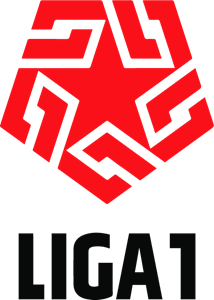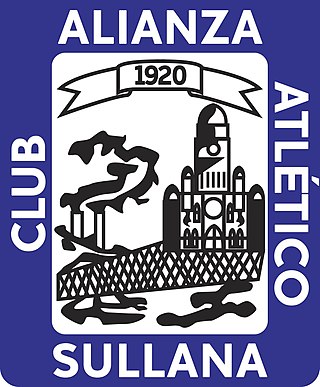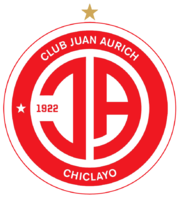
Club Universitario de Deportes is a Peruvian sports club based in Lima, which has football as its main activity. It also has women's football, voleyball and basketball sections. The football team, popularly known as Universitario, has competed in the top tier of Peruvian football, the Liga 1, since 1928. They are the most successful team in Peruvian football with 28 titles and have never been relegated. The club was founded in August 1924 under the name Federación Universitaria by students of the National University of San Marcos but was forced to rename in 1931.

Foot Ball Club Melgar, known simply as FBC Melgar or Melgar, is a Peruvian professional football club based in Arequipa, Peru. It is one of Peru's oldest football teams, founded in 1915 under the name Juventud Melgar by a group of football enthusiasts from Arequipa. The club currently participates in the Peruvian Primera División, the top tier of Peruvian football.

The Peru First Division, officially known as Liga 1, is the top flight of association football in Peru. It has been referred to as Torneo Descentralizado since 1966, when the first teams residing outside the Lima and Callao provinces were invited to compete in the inaugural league national competition.

Club Alianza Atlético de Sullana, shorted to Alianza Atlético, is a Peruvian football club, located in the city of Sullana, Piura. The club was founded in 1920 and promoted to the Peruvian Primera División, where they currently participate, in 1988 and again in 2015. Alianza Atlético has a long-standing rivalry with Atlético Grau and Atlético Torino, other clubs in the Piura Department. They are one of the only Peruvian top-tier clubs not based in a state capital.
Paulo Rinaldo Cruzado Durand is a Peruvian footballer who plays as a midfielder.
The 2009 Torneo Descentralizado de Fútbol Profesional was the 93rd season of Association Peruvian football. A total of 16 teams competed in the tournament. The season began on February 14 and concluded on December 13 with the victory of Universitario de Deportes over Alianza Lima in the second leg of the final Play-off, giving Universitario its twenty-fifth Peruvian title.
The 1967 Torneo Descentralizado was the 51st season of the highest division of Peruvian football. Although Alfonso Ugarte de Chiclín and Octavio Espinosa were relegated last season, they regained promotion to the first division through the 1967 Copa Perú which was played prior to the start of the first division. Juan Aurich of Chiclayo made its debut in the first division in this season.

Club Atlético Grau, more commonly known as Atlético Grau or simply, Grau, is a Peruvian professional football club based in the city of Piura. The club was founded in 1919 and currently plays in the Peruvian Primera División, the top tier of Peruvian football. It is among one of the most popular clubs in northern Peru and is the largest club in Piura. Atlético Grau has a long-standing rivalry with Alianza Atlético of Sullana, known as the Clásico Piurano.
The 1993 Copa Perú season, the promotion tournament of Peruvian football.
The 2011 Torneo Descentralizado de Fútbol Profesional was the ninety-fifth season of Association Peruvian football. A total of 16 teams competed in the tournament, with Universidad de San Martín as the defending champion. The Torneo Descentralizado began on 12 February and concluded on 14 December with the victory of Juan Aurich over Alianza Lima in the penalty kicks of the final Play-off, giving Juan Aurich its debut Peruvian title.
The Torneo Descentralizado is the national Peruvian professional league for association football clubs. At the top of the Peruvian football league system, it is the country's primary football competition. The responsibility for its organization lies within the Asociación Deportiva de Fútbol Profesional. Contested by 16 clubs, it operates on a system of promotion and relegation with the Segunda División and the Copa Peru. Seasons run from February to December but the competition format varies from season to season. Most games are played on Saturdays and Sundays, with a few games played during weekday evenings. It is currently sponsored by Movistar TV and therefore commercially known as the Torneo Descentralizado Copa Movistar.
Mauricio Alejandro Montes Sanguinetti is a Peruvian footballer who plays as a striker for Cusco FC in the Torneo Descentralizado.
The 2012 Torneo Descentralizado de Fútbol Profesional is the ninety-sixth season of Association Peruvian football. A total of 16 teams competed in the tournament, with Juan Aurich as the defending champion. The Torneo Descentralizado began on February 19 and ended on December 9, 2012.
The 2013 Torneo Descentralizado de Fútbol Profesional is the 97th season of the highest division of Association Peruvian football. A total of 16 teams competed in the tournament, with Sporting Cristal as the defending champion. The Torneo Descentralizado began in February and ended in December 2013.
The 2014 Torneo Descentralizado de Fútbol Profesional was the 98th season of the highest division of Peruvian football. A total of 16 teams competed in the tournament. The Torneo Descentralizado began on June 7 and ended on December 21 2014.
The 2014 Torneo del Inca was the 2nd season of the Peruvian domestic cup. A total of 16 teams were competing in the tournament from the 2014 Torneo Descentralizado. The Torneo del Inca began on February 14 and is ended on May 21.
The 2017 Torneo Descentralizado de Fútbol Profesional was the 101st season of the highest division of Peruvian football. A total of 16 teams competed in the season. Alianza Lima were the champions.
The 2018 Torneo Descentralizado de Fútbol Profesional was the 102nd edition of the top flight of Association football governed by the Federación Peruana de Futbol (FPF). There were 16 teams in play; Alianza Lima were the defending champions. Sporting Cristal won their nineteenth domestic championship on 16 December after beating Alianza Lima in both legs of the finals.
The 2019 Liga 1 de Fútbol Profesional was the 103rd season of the highest division of Peruvian football. A total of 18 teams competed in the season, with Sporting Cristal coming in as defending champions.








